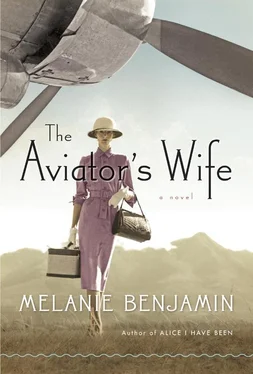“I’m sorry—I haven’t had a chance to see Mexico yet, except from the train.”
“I understand,” he said. Then he turned and stared straight ahead, his chiseled cheekbones and smooth brow immobile.
I thought and thought of something to say; something important enough for him. But I couldn’t, and so we rode the rest of the way in silence. It wasn’t long; soon the car turned off the road and bumped across a wide, flat field dotted with several outbuildings. The platform where Daddy and all the dignitaries must have stood, waiting for his landing days earlier, still remained; now-tattered bunting featuring the colors of both the Mexican and United States flags was suddenly illuminated by the headlights of our car.
Outside the largest structure, a horse stood, tethered to a railing.
The car stopped, and we both got out; I followed the colonel into that building, so large it resembled a barn. Instead of being divided into stalls, however, the place was cavernous. Instead of horses, planes were housed within it. And instead of the fragrance of sweet hay and horse manure, the air was noxious with the fumes from oil and gasoline.
“Good morning,” the colonel called to a man wearing mechanic’s coveralls who scrambled hastily from a camp bed. There was a rifle next to the bed. The man yawned, but then his face creased into a proud grin as he recognized his visitor.
“Oh, it’s you, Colonel!”
“I trust there’s been no trouble?”
“None at all! But of course, you see, I have my weapon. Just in case, Colonel.”
Nodding briskly, the colonel grabbed a wrench and strode in the direction of an airplane parked at the far end of the barn. It took me a moment to realize that this was his plane; the plane. The Spirit of St. Louis .
I took off after him, glad for my flat golf shoes, as there were treacherous puddles of slippery grease dotting the ground. “Oh, Colonel, may I see it?”
“Please, call me Charles,” he called over his shoulder.
“If you’ll call me Anne.”
My escort stopped for a moment. He nodded slowly, as if mulling over the proposition. Then he said, “Anne.”
It was a good thing he didn’t say anything else, as suddenly my ears were filled with the roaring sound of my own pulse. How can I describe how it felt, to have him say my name? Oh, it was rubbish, ridiculous, I knew, but for once I felt as if I might understand the literal definition of the word swoon .
Then he continued toward his plane. “I just want to tighten an axle. I noticed it was loose when I landed.”
“Why did that man have a rifle?”
Charles sighed. “To protect my plane from souvenir hunters. They tore off pieces of it when I landed in France. Since then, I’ve had someone guarding it at all times.”
“Oh.” I scrambled to keep up with him; he was so tall, his stride so long. And I was so short. We passed several planes, and I wondered which one we would fly in. Of course I knew, even before I saw it up close, we couldn’t fly in the Spirit of St. Louis . It was famously built just for one; one courageous, lone flyer.
Who was now on his hands and knees, crawling under his machine. I watched, awed; I had seen this plane only in newsreels. So while I recognized the wide, blunt wings; the cockpit built so that its pilot could see only out the sides, not the front—there was some technical reason for this, I remembered, but couldn’t recall it; the jaunty Spirit of St. Louis painted on the nose, black against the silver of the body; still, I couldn’t help but think that it was so much smaller in person. Just like a movie star; just like Gloria Swanson—I giggled, remembering. How odd to think that this plane was now even more famous than she was!
“What’s so funny?” that reedy voice demanded, from beneath the plane.
“Nothing.”
“When I landed the other day I thought I felt something give. I thought—aha! There it is!” And after a few methodical grunts, the colonel emerged, still on his hands and knees, from beneath the plane; his face was greasy, and his hair flopped down into his eyes. He had a grin on his face as he remained on the ground, resting his back against the wheel of his plane.
He looked so relaxed now, not the stiff, uncomfortable figure in evening clothes from the night before. I hadn’t realized how tense he had been then. Now his limbs looked loose, lanky; he patted the plane in the same manner as a cowboy caressing his favorite horse. I almost felt as if I was intruding on an intimate scene.
“May I touch it?” I asked, surprised by my boldness.
“Of course!” Charles leaped to his feet. “Go on—you can’t hurt it!” He grinned again, this time so wide that his entire face relaxed, his eyes crinkling up boyishly.
“Why, it’s fabric!” I couldn’t believe it; this machine that had carried him all the way across the ocean was made of nothing but cloth and wire!
“Yes. Fabric covered in dope—that’s a kind of strengthening liquid. That’s what makes it strong enough but also light enough to fly.”
“Is the plane we’re going up in made of fabric, as well?”
“Yes. But don’t worry, Miss—Anne. I assure you, it’s perfectly safe.”
“Oh, I’m sure it is.” I wanted to explain to him that I wasn’t afraid; how could I be? There was no one I trusted more than Charles Lindbergh, even though I had just met him. Who else could I trust to launch me into the sky?
The next minutes were full of activity; after Charles inspected it, the guard hooked up the nose of a different plane—a biplane, I recognized from Charles’s discourse the night before—to a tractor. This one was painted blue with a vivid orange trim, not the monochromatic silver and gray of the Spirit of St. Louis . With a startling roar that scattered the swallows gathered near the entrance, the tractor fired up and towed the plane out of the building. Charles found a helmet and goggles for me, and I followed him—again, running to keep up—out of the barn and to the plane, which was now at the end of a narrow, closely cropped strip of grass in the middle of the field. In the faint morning light, I could barely make out a flag at the end of this runway, waving in the gentle breeze.
The air was warm and smelled sweet, like rock candy. There were a few white, puffy clouds high above, and I couldn’t believe that in a few moments I would be among them.
Buckling my helmet beneath my chin, I eyed the plane; the two seats were in tandem, the one in back slightly higher than the one in front. They were both open to the sky.
“How do we get in?”
“We climb up on the wing,” Charles answered. Then he leaned toward me and tightened the helmet strap. “There.” He studied me solemnly, nodding, as if assuring himself that I was as snug as possible. I felt the careful weight of his attention yet knew, at the same time, that I was merely part of his preflight checklist, represented by a piece of paper he had tucked in a pocket; he had already measured the fuel, tested the throttle, wiped the smudges off his goggles. Then he busied himself with pulling on his leather gloves.
“It’s very loud and very windy up there,” he told me, his voice suddenly all business, brisk and gruff. “We won’t be able to communicate. There are controls in your seat, but don’t worry, they’re not operable. I’ll be in back, you’ll be in front. Make sure you buckle your harness strap when you get in. I’d keep my hands inside if I were you. Oh—and chew this.” Reaching into the pocket of his jacket, he pulled out a stick of gum.
“Why?”
“It’ll pop your ears. You’ll see.”
“All right.” Obediently, I removed the wrapper and popped the gum in my mouth. “Anything else?” I mumbled, chewing away until my jaws ached.
Читать дальше












